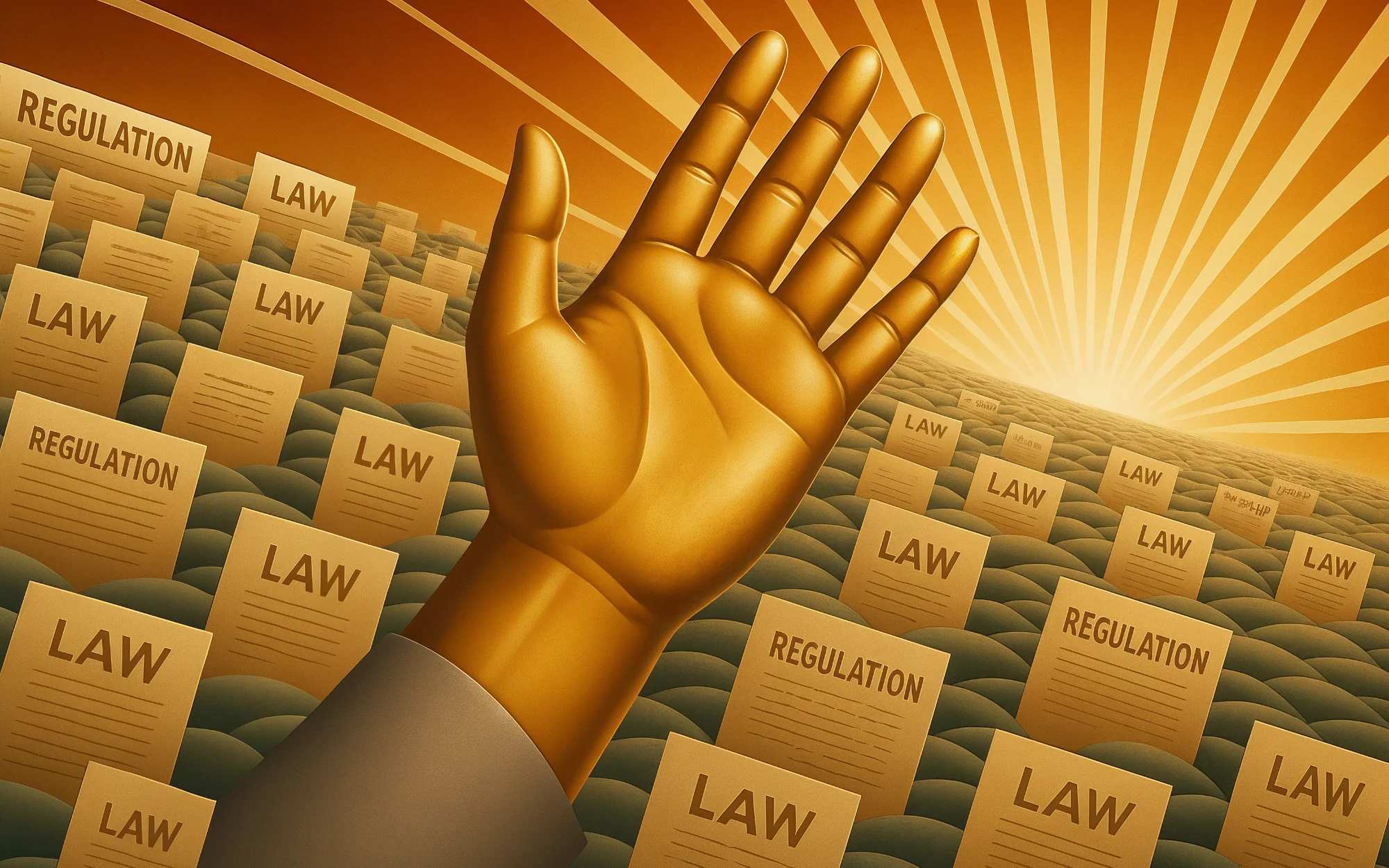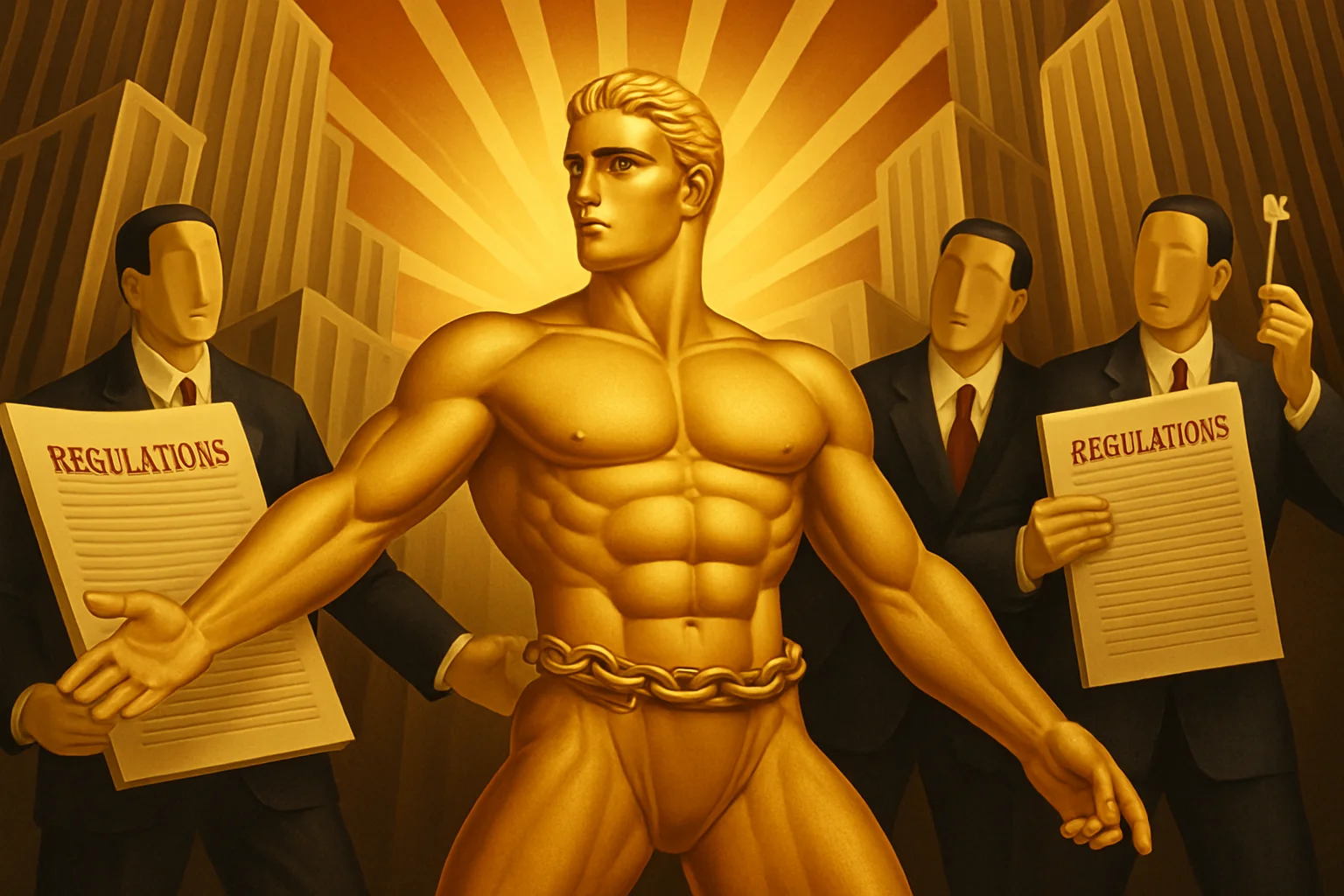The Modern Atlas Shrugged
The Looters in Action

In “Atlas Shrugged,” the looters are depicted as politicians, bureaucrats, and businessmen who exploit government power to seize resources from productive people to redistribute them, justifying their actions with collectivist rhetoric.
When you see that trading is done, not by consent, but by compulsion—when you see that in order to
produce, you need to obtain permission from men who produce nothing—when you see that money is
flowing to those who deal, not in goods, but in favors—when you see that men get richer by graft
and by pull than by work, and your laws don’t protect you against them, but protect them against
you—when you see corruption being rewarded and honesty becoming a self-sacrifice—you may know that
your society is doomed.
“Directive 10-289” is one of the most controversial examples in the novel. It freezes all employment and prohibits workers from leaving their jobs. Additionally, it mandates that production levels remain unchanged; all businesses must produce the same amount as before. All patents and innovations must be surrendered to the government.
The “Anti-Dog-Eat-Dog Rule” bans “destructive competition” and is used to undermine Dan Conway’s Phoenix-Durango railroad to protect established companies.
“The Equalization of Opportunity Bill” restricts individuals to owning only one business, forcing Hank Rearden to divest his ore mines and coal operations.
The government nationalizes all railroad companies and develops “Project X” using stolen technology as a tool for coercion. Steel producers are compelled to supply steel based on “need” rather than market principles, regardless of their ability to pay. Despite its superior qualities, Rearden Metal faces production limits because it is accused of having “unfair advantages,” which prevents it from harming competitors. Hank Rearden is prosecuted for selling his metal to customers of his choice. As the story unfolds, the government increasingly resorts to blackmail, coercion, and even torture.
Government Overreach
The Absurdities of Overregulation
The European Union, which started as a free trade zone, has transformed into a bureaucratic leviathan that intrudes into every aspect of life. It has become a tool for the wealthy elite to maintain their power and wealth at the expense of ordinary people. There is no area of life that the EU does not seek to control. From how people live and what they eat to how they manage their health, heat their homes, and choose their cars, there is likely a task force or group advocating for regulations on every conceivable issue. This often occurs against the wishes of the overwhelming majority of European citizens who reject these measures.

We decide something, then put it out there, and wait for a while to see what happens. If there’s
no outcry or uproar because most people don’t even understand what’s been decided, then we move
forward—step by step, until there’s no turning back.
The EU is blindly and authoritatively adhering to beliefs about global warming and constantly intervening in the free market to promote its ideology. For example, it banned non-clear (frosted) bulbs and clear bulbs over 100 W starting in 2009. In 2012, it prohibited retailers from selling 40-watt and 25-watt incandescent bulbs. Between 2016 and 2018, it banned halogen bulbs and significantly intervened in the free market economy.
The European Union has mandated that all mobile phones, tablets, and cameras sold in the EU must use USB-C charging ports by the end of 2024. As a result, Apple has been forced to replace its lightning connectors. While this may seem like a push for standardization, it could harm customers eventually. Companies may hesitate to invest in new connector technologies because regulations often lag behind innovation. Consequently, we might still be using USB-C in 50 years due to regulatory interference in the market.
Another consumer product affected by bureaucratic intervention was the EU vacuum cleaner power regulation introduced in 2014. Initially, the limit was set at 1,600 watts but was later reduced to 900 watts. The regulation also established noise limits of 80 dB and introduced performance requirements. Critics argue that consumers now need to vacuum longer to achieve the same cleaning power, making it particularly challenging to remove pet hair.
Additionally, there was an attempt to regulate the shape and size of cucumbers under Commission Regulation (EEC) No. 1677 / 88, which specified that cucumbers should be 30 cm long with a maximum curvature of 10 mm per 10 cm. These specific marketing standards were abolished in 2009 as part of a broader effort to reduce unnecessary food waste and simplify regulations.
The absurd regulations that make headlines are just the tip of the iceberg. EU Regulation No. 852 / 2004 introduced hygiene standards for food products to ensure safety and quality throughout the supply chain. However, it has faced criticism for being overly prescriptive and burdensome, leading to increased costs for businesses and reduced competitiveness in the global market. These rules also affect rural women, preventing them from selling their cakes at local events due to the fear of being fined for non-compliance.
Another significant regulation took effect in December 2024, requiring detailed information on wood products, such as books, to ensure they are deforestation-free. This includes HS codes, the country of wood origin, geographical coordinates of the wood’s source, production date, and a deforestation-free certification. Compliance costs may lead to a decline in paper books.
A particularly controversial regulation has recently made headlines, raising concerns about food safety, political control, and the impact on local agriculture: the EU’s new regulation on insect-based food. This regulation allows the addition of insect larvae flour to various foods, including bread, pizza, and chocolate. Up to 5 grams of common house crickets can be added to 100 grams of certain meat products. However, EU regulations prohibit adding insects to animal food, creating a contradiction with the new regulation on insect-based food. Critics argue that this new regulation was introduced to handle the challenge of removing insects from food caused by strict pesticide regulations.
The EU is actively combating smoking. After an initial attempt to ban smoking in public places failed, the EU is now advocating for a ban using “all means possible.” This reflects a common pattern in the EU’s authoritarian approach to controlling its citizens’, their behavior, and their choices. If a proposed regulation or ban fails, they simply try again until they succeed.
How EU Policy Undermines Europe’s Food Security
The European Union is engaged in an ongoing battle with farmers. Regulations concerning fertilizers, and agricultural practices are making it increasingly difficult for farmers to produce food and compete in the global market. The EU Fertilizing Products Regulation (EU) 2019 / 1009 took effect on July 16, 2022, replacing the previous regulation from 2003. This new regulation expands the scope to include organic, organomineral, and secondary raw material-based fertilizers, in addition to traditional mineral fertilizers. Farmers must comply with hundreds of rules and regulations, which often conflict with one another, complicating adherence. Drones are used to monitor compliance with planting regulations and enforce adherence automatically.

Since late 2023, European farmers have been protesting across the continent due to rising production costs, particularly for fuel and fertilizer, while facing declining incomes and product prices. They oppose the EU environmental regulations from the Green Deal, which impose costly burdens without adequate compensation for farmers. Cheap agricultural imports from Ukraine, which do not have to follow the strict EU regulations, are flooding the market and driving down prices by 40%.
The War on Wheels: The Push to Confine and Control Citizens
The EU is waging a war on individual mobility with its ongoing attacks on cars. Its latest initiative, innocuously titled “Updated Rules for Safer Roads, Less Air Pollution, and Digital Vehicle Documents,” is marketed as a step toward improved public safety and environmental stewardship. However, beneath the surface, it represents another move in a coordinated plan that aligns with the World Economic Forum’s vision—“You’ll own nothing and be happy”—and the United Nations’ Agenda 2030 sustainability goals. The EU’s Transport Commissioner, Apostolos Tzitzikostas, claims a noble mission: to halve road deaths and serious injuries by 2030. On paper, who could object? In practice, however, these rules focus less on safety and more on control and the gradual erosion of personal mobility.

Consider the following numbers: In 2024, Germany recorded only 2,780 road traffic deaths, the third lowest since 1953. In contrast, violent knife attacks resulting in serious injuries totaled 8,160 in 2022, three times higher than traffic fatalities. Despite these statistics, Brussels remains focused on cars, particularly on the “challenges posed by unsafe and aging vehicles.” They have now introduced a plan requiring every car over ten years old to pass annual inspections. This expensive and inconvenient process will compel many to scrap reliable vehicles. Since half of Germany’s cars are over ten years old, this measure effectively targets the working and middle classes who depend on older, affordable vehicles.
Accident statistics indicate that human errors—such as turning mistakes, failure to yield, tailgating, speeding, and impaired driving—are the main causes of road accidents, rather than vehicle age. Nevertheless, the EU justifies its crackdown by promising to “save 7,000 lives and prevent 65,000 serious injuries” by 2050. This claim seems unconvincing in light of the actual causes of accidents.
What’s truly at stake is independence. The unmonitored, unbugged private car represents one of the last bastions of personal freedom, much like cash in the digital age. The EU’s war on cars is a war on autonomy. New mandatory digital “Driver Monitoring” systems enable authorities to restrict movement, ration kilometers, and track every journey, transforming vehicles into rolling surveillance devices. The transition to “Software Defined Vehicles” and electric cars replaces robust, repairable machines with complex, expensive, and tightly controlled systems—far removed from the practical cars of the past.
Meanwhile, regulatory and financial pressures are mounting. Higher taxes, insurance costs, parking fees, and increasingly strict emissions rules are making car ownership less affordable. Even obtaining a driver’s license is becoming prohibitively expensive, and older drivers must undergo regular tests to justify their continued mobility. In Germany, innovative punishments—such as revoking licenses for unpaid child support—set a precedent for further restrictions based on social compliance.
From the authorities’ perspective, car use is tolerated only if it serves the needs of the state. The ideal scenario is the “15-minute city,” where citizens are confined to small zones, work from home, and rely on digital surveillance. The EU’s relentless push for control, masked as concern for safety and the environment, is more about limiting citizens’ freedom to move, own, and make their own decisions.
Central Planning in the Digital Age
Lately, the EU has introduced numerous new regulations, including the AI Act, the General Data Protection Regulation (GDPR), the AI Liability Directive, the Digital Services Act (DSA), the Digital Markets Act (DMA), and the EU Accessibility Act. While each regulation may offer valuable concepts, they collectively stifle innovation and impose excessive costs on businesses. Until mid-2025, every company in the EU must migrate all their digital products to comply with the EU Accessibility Act. This presents a significant financial burden, estimated to range from €28 billion to €70 billion.
The DSA, in particular, is used as a tool to control the internet and limit freedom of speech. It is no wonder that there is a lack of innovation and large companies in Europe. Bureaucrats seem to focus solely on regulation.
America innovates, China replicates, Europe regulates.
The European Union has become an unwieldy bureaucratic apparatus that stifles innovation and imposes excessive costs on businesses. It regulates cookie banners on websites and plastic caps on bottles while suffocating markets with central planning, regulations, and bureaucracy. The EU employs 58,000 people, and the cost of transporting staff between Brussels and Strasbourg totals 114 million euros per year. The annual administrative budget to maintain this bureaucracy is 11.3 billion euros, representing 6% of the EU’s total budget.
The Public Sector
Across Europe, the public sector has emerged as a colossal employer, funded largely by taxpayers. In Germany, the state employs over 5.2 million people, making it the nation’s largest employer. This number has climbed steadily from 4.7 million in 2010 to 5.2 million by 2025, signaling a growing reliance on government jobs. Among Germany’s top 25 employers, five are directly state-owned, including Deutsche Bahn (100% federally owned), while others like Volkswagen (with 20% voting shares held by Lower Saxony) reflect significant state influence. Roughly half of the top 10 employers are state-affiliated, including public services at federal, state, and municipal levels, as well as social insurance agencies.
This trend isn’t unique to Germany. Throughout the EU, public sector jobs often outnumber private sector opportunities, fostering stability but also dependency. Rand’s vision of a “mixed economy”—where government encroaches on private enterprise—finds an echo here, as the state’s dominance in employment reshapes economic priorities.
Economic Costs and Inefficiency
The financial toll of bureaucracy is staggering. In Germany, personnel costs in the federal budget jumped from 6.1% in 2021 to an estimated 9.7% in 2024, yet essential services like healthcare remain understaffed, with only 210,000 of the 5.2 million public employees in critical roles. The annual cost of bureaucratic red tape is estimated at €146 billion, a burden that disproportionately hits small and medium-sized enterprises (SMEs)—the lifeblood of the economy. These firms struggle to comply with a maze of regulations, echoing the plight of Rand’s fictional innovators like Hank Rearden, crushed by government overreach.
The EU amplifies this burden. Elon Musk, speaking at the 2025 WELT Economic Summit, called the EU headquarters in Brussels a “cathedral of bureaucracy,” pointing to the added layer of complexity it imposes on national and provincial rules. Despite a smaller administrative footprint than the U.S., the EU’s directives deepen the regulatory quagmire, frustrating businesses and citizens alike.
Tax Code Complexity: A Growing Web
Bureaucratic sprawl extends to tax systems. Over two decades, France and Germany have doubled the word count of their tax codes, turning compliance into a labyrinthine ordeal. This complexity fuels a vast network of tax authorities and advisors, further bloating the public sector. The OECD’s push for tax harmonization has exacerbated this trend, aligning Europe’s tax systems in a web of intricacy. Advocates for a flat tax argue it could slash bureaucracy, but opposition citing equity concerns stalls reform.
This pattern is echoed across the European Union. In Italy, businesses often face overlapping and sometimes contradictory tax rules at the regional and national levels, leading to frequent disputes and administrative headaches. Spain’s tax system, riddled with exceptions and special regimes for autonomous communities, demands constant interpretation and adjustment from both taxpayers and officials. In the Netherlands, incremental changes have led to a sprawling tax code that requires even small enterprises to seek professional help for basic filings. The introduction of EU-wide regulations, such as the DAC6 directive on tax transparency, has imposed additional layers of documentation and reporting, further complicating compliance for cross-border activities. Even routine processes, like reclaiming VAT across member states, involve intricate forms and lengthy verification procedures. Critics note that this administrative complexity not only increases costs but also creates uncertainty, discouraging investment and innovation throughout the EU.
A Modern-Day Big Brother
The European Union is increasingly infringing on the autonomy of its citizens through regulations and surveillance. Germany is a leader in surveillance, actively pursuing user data from tech giants. Over the past decade, German authorities have requested information on 709,400 accounts—seven times the global per-person average. With 850 requests per 100,000 residents, Germany ranks second only to the United States, far surpassing Austria (136 requests) and Switzerland (245 requests per 100,000 citizens). In 2022 alone, requests surged by 38%, with a 65.4% response rate from tech companies. For example, Apple complied with 83% of German requests, up from 75% in 2016. This relentless data collection indicates a state eager to scrutinize every aspect of its citizens’ digital lives.

The German Federal Office for the Protection of the Constitution (Verfassungsschutz) amplifies these concerns. Since Thomas Haldenwang took over in 2018, the agency has accumulated 485,000 datasets of personal information. Critics label it “Stasi 2.0,” referencing the legacy of the East German secret police and its extensive surveillance. Is this a “defensive democracy” or the foundation of a surveillance state? Public unease grows as historical parallels clash with modern realities. They even have an extensive dossier on the former president of the Verfassungsschutz, Hans-Georg Maaßen, who served from 2012 to 2018. He was dismissed from his position due to public statements regarding false claims of far-right attacks on migrants in Chemnitz, which were later proven to be false by a court, as Maaßen had claimed. Since then, Maaßen has been categorized as an enemy of the state, and they have started collecting material to use against him.
Germany’s influence extends beyond its borders, shaping policies across the EU. Under the Digital Services Act (DSA), effective since October 2022, Germany leads in requests to platforms like Meta, reflecting its strict approach to online content regulation. Human Rights Watch has identified Germany’s 2021 surveillance laws as a threat to privacy, yet the country continues to advocate for stricter digital oversight.
The EU’s surveillance saga is a decades-long struggle between security and liberty. In 2006, the Data Retention Directive required telecom providers to store user data for up to two years to combat serious crime. However, in 2014, the Court of Justice of the European Union (CJEU) struck it down, citing its disproportionate invasion of privacy. Despite this, the EU persisted. A 2016 EU-US data-sharing agreement aimed to balance law enforcement needs with privacy, while countries like Germany and France expanded national surveillance laws after the 2015 terror attacks—moves often criticized for their breadth.
In 2021, the EU tightened export controls on surveillance technology to curb abuses abroad, but domestic practices remain contentious. The 2023 Child Sexual Abuse Regulation (CSAR) proposal suggests further monitoring, underscoring a pattern: each setback spurs new attempts to entrench state power.
Post-2025, the EU’s surveillance ambitions may intensify. Proposals for encryption backdoors threaten secure communications and could revive mass telecom surveillance. Harmonized data retention laws might reappear, disguised as “technology-neutral” solutions to security threats. While export controls on surveillance technology may tighten, domestic use remains contentious. The EU’s ongoing struggle between security and privacy—enshrined in its Charter of Fundamental Rights—promises further legislative battles.
It is unlikely that the rules applied to you will also be enacted for politicians like Ursula von der Leyen. She has faced scrutiny over her use of SMS in two significant scandals: the defense consultancy affair during her tenure as German Defense Minister and the Pfizergate scandal related to COVID-19 vaccine contracts. The first scandal involved allegations of cronyism in awarding contracts to consultants. The investigation encountered challenges when her phone data, deemed evidence, was wiped by the Defense Ministry, which claimed it was for security reasons. This action was criticized as an attempt to sabotage the probe, but it remains unclear if the investigation was officially halted. The Pfizergate scandal centered on text messages between von der Leyen and Pfizer CEO Albert Bourla during vaccine negotiations. Her refusal to release these messages has led to legal challenges and ongoing investigations by the European Public Prosecutor’s Office (EPPO).
Who Is Watching Your Wealth?
Another dark cloud of totalitarian control is emerging on the horizon. The European Union plans to systematically record and manage assets through the introduction of an asset register. A central database will consolidate all asset values exceeding 200,000 EUR. Citizens will be required to declare all account movements, stock holdings, company investments, cryptocurrencies, and even cash. Additionally, assets located outside the European Union must be registered. Violating this reporting obligation can result in hefty fines of up to one million euros for individuals and over ten million euros for banks.

The new Anti-Money Laundering Authority (AMLA) will be granted extensive sanctioning powers, including the ability to block accounts and prevent transactions.
Furthermore, the EU intends to allow access to the asset register not only to state authorities but also to “persons with a legitimate interest.” Journalists, NGOs, universities, and international institutions will have access to sensitive data. This access increases the risk of abuse, targeted spying, and political pressure. Supporters of unpopular projects could quickly become targets for media scrutiny and NGO actions. Public shaming could lead to account suspensions or blocked transactions. A Europe-wide mega database becomes an attractive target for cybercriminals.
The EU plans to tighten asset confiscation measures and can seize assets under certain conditions. The burden of proof is reversed; citizens must demonstrate that their assets are legal, rather than the state proving they are illegal. The government can utilize assets to address economic crises even without any criminal suspicion.
This lays the groundwork for a digital euro, announced for late 2025, which will facilitate a surveillance system and provide direct access to citizens’ assets.
Additionally, access to cash is being restricted. In the EU, a €10,000 cash payment limit will be implemented in three years to combat money laundering and terrorist financing. Member states can establish lower limits. This rule excludes private transactions between individuals, such as selling a car to a neighbor. However, the EU often encroaches gradually on civil liberties, so it is possible that this limit may be lowered and applied to private individuals in the future.
Who Is Watching Your Health?
Lately, the European Union has significantly expanded its digital infrastructure, with Germany leading the way in implementing new technologies to streamline public services. A key example is the introduction of the digital patient record (elektronische Patientenakte, ePA), which became mandatory for all citizens with statutory health insurance in Germany starting in 2025, although opting out is still permitted. This digital file stores sensitive health data, prescriptions, and medical histories, making them accessible to healthcare providers and, under certain conditions, to insurance companies and government agencies.

While the official justification is increased efficiency and improved medical care, critics warn that these measures indicate a shift toward a surveillance society reminiscent of dystopian worlds. The EU’s broader push for digital identity frameworks, combined with data retention laws and the expansion of AI-powered monitoring, raises serious concerns about personal autonomy and freedom. The EU plans to implement the European Health Data Space (EHDS), a central system that aims for nearly all member states to join by 2025, with exchanges starting in early 2028. This system will enable cross-border access to electronic health records, including patient summaries, prescriptions, medical imagery, and laboratory results. Participation will be mandatory, with no option to opt out.
In Germany, the Federal Commissioner for Data Protection has repeatedly criticized the lack of robust safeguards and the risk of unauthorized access or misuse of personal health information. The ePA was hacked before its introduction by hackers in Germany, who gained access to the system, raising alarms about the security of sensitive data. This incident highlighted vulnerabilities in the digital infrastructure and the potential for abuse by state authorities or private entities.
Citizens fear that these systems could be used to profile individuals, influence insurance premiums, or restrict access to services based on algorithmic assessments. As the lines between public health, private data, and state oversight blur, many worry that the promise of digital convenience comes at the expense of fundamental rights. This echoes warnings about technocratic control and the loss of individual agency. Given the massive overreach of the state during COVID-19, these developments are particularly alarming.
State Control Mechanisms
Media Bias & Propaganda
Germany has the largest public broadcasting network in the world, with a budget of around 10 billion euros collected from every citizen, regardless of their service usage.

The system is enforced via mandatory fees (€18.36 per month), with critics claiming this compulsion is akin to financial coercion, especially given the perceived lack of neutrality and the one-sidedness in representation. A refusal to pay this fee can lead to the seizure of personal assets and even imprisonment. Georg Thiel became widely known for his imprisonment due to his refusal to pay the German broadcasting license fee. He was brought into administrative detention (“Erzwingungshaft”) to force compliance with court-ordered payments and remained in prison for 181 days (nearly 6 months). He didn’t pay his debt but needed to be released due to limits on administrative detention.
This broadcasting system funds 22 television stations, 67 radio stations, and over 175 YouTube channels, employing more than 25,000 people.
Ninety-two percent of its employees support socialist parties: the Green Party “Die Grünen” (57.1%), the former SED party “Die Linke” (23.4%), or the Social Democratic Party “SPD” (11.7%).
When the public broadcasting system was founded, it aimed to be independent and free from government influence. However, over the years, it has become increasingly politicized and biased. Critics argue that the system has lost its original purpose and now acts as a mouthpiece for the government and ruling parties, particularly the left-wing parties.
The claim that ARD and ZDF serve as platforms for “Regierungspropaganda” (government propaganda) has merit. Their vast budgets allow for continuous broadcasting across many channels, leaving little space for dissenting voices. Several former and current employees have shared their experiences in this culture of censorship and manipulation. They express concern over the lack of political and social diversity within the editorial staff.
In 2017, the ARD commissioned a “Framing Manual” from a communication scientist to train staff in using specific linguistic and psychological techniques to persuade the public of the value of public broadcasting. This internal PR initiative cost €120,000. The manual recommended “manipulative communication tricks,” which critics labeled as evidence of top-down propaganda.
Critics argue that public broadcasters often attack all opposition, labeling dissenters of government policy as “rechtsextrem” (right-wing extremist). This practice effectively stifles genuine democratic debate and stigmatizes opposing political forces. Furthermore, public media and affiliated organizations engage in coordinated efforts to silence or marginalize alternative media and dissenting voices. A notable criticism was directed at ARD’s show “Die 100 – Was Deutschland bewegt” (The 100 – What Moves Germany), which relied on dystopian, emotionally manipulative tactics instead of fostering sincere dialogue. The audience is depicted as passive “game pieces,” while the medium prioritizes creating “social pressure and emotionalization” for conformity over promoting public reasoning or maturity.
During the COVID-19 era, the German population experienced a clear use of “military-grade” propaganda techniques. Government-aligned experts dominated television talk shows, while opposing views were largely absent. This contributed to a sense of a monolithic narrative and heightened public fear.
An INSA survey found that trust in ARD and ZDF has plummeted. The majority of the adult population now mistrusts these public broadcasters, a trend that corresponds with accusations of perceived bias.
The public broadcast network frequently attracts negative attention due to its manipulation of interviews and biased reporting. In the first three months of 2025, it staged hundreds of interviews. A common practice involves using local politicians from left-wing parties disguised as “normal citizens.” On several occasions, the network even featured its own employees as interview partners without disclosing their affiliations. Multiple media outlets, such as the 𝕏 account ÖRR Blog and Critical Cat, track these instances of fraud and propaganda. It is clear that anyone consuming content from this state broadcaster is either unaware of the decline or refuses to acknowledge it.
Political Lawfare: Silencing Dissent
At the EU level, lawfare manifests as legislative initiatives designed to expand state power over speech. Ursula von der Leyen, President of the European Commission, has proposed a new law to criminalize “hate speech” throughout the EU. This initiative requires unanimous approval from all member states and faces political challenges, particularly from leaders like Hungary’s Viktor Orbán and Slovakia’s Robert Fico. The law’s broad scope—criminalizing not only discrimination but also negative stereotyping of groups—has raised concerns that it could suppress legitimate discourse, including reporting on immigration-related crime statistics.

In Germany, lawfare is directly targeted against individuals who criticize the state. A significant group of politicians, particularly from the Green Party and the FDP, including Robert Habeck, Marie-Agnes Strack-Zimmermann, Annalena Baerbock, and Katrin Göring-Eckardt, leads in suing ordinary citizens. Some have filed lawsuits against over 1,000 citizens. Many of these cases involve the services of the agency SO-DONE, which specializes in automatic cease-and-desist letters. They utilize AI to scan social media platforms and identify posts that infringe on their clients’ rights.
Germany has several sections in its criminal code that are frequently used against its citizens. In addition to the regular insult law (§ 185 Beleidigung), which punishes insults with up to one year of imprisonment or a fine, there is also a law introduced under Angela Merkel that targets defamation of individuals in political life (§ 188 Gegen Personen des politischen Lebens gerichtete Beleidigung, üble Nachrede und Verleumdung). This law is invoked thousands of times each year to raid the homes of citizens for memes, jokes, or puns directed at politicians.
A report on the American TV show “60 Minutes,” which aired in February 2025, highlighted Germany’s approach to combating online hate speech. The report features interviews with German prosecutors from the “Central Office for Combating Hate Crime on the Internet” in Lower Saxony, who share their views on the limits of free speech. The prosecutors explain how they conduct early-morning raids to seize individuals’ phones and laptops over allegedly illegal social media posts, even if the posts were merely shared and not authored by the individual. The lawyers joked that the main punishment is confiscating devices rather than fines, suggesting that this practice serves as a tool of oppression against dissent. Typically, all electronic devices—computers and mobile devices—are confiscated, and in numerous instances, individuals never get them back. This results in significant harm to individuals, who must replace all their devices and may struggle to perform everyday tasks without them.
The worst paragraph is incitement to hatred (§ 130 Volksverhetzung), a vague provision that can be applied to anyone for any reason. Originally intended to combat anti-Semitism and to prevent calls for violence against specific groups, it is now used for a wide range of issues. If you mention the overrepresentation of a particular ethnic group in crime or express dislike for LGBT propaganda, your words can be interpreted as hate against groups or subsets of groups. This law is consistently enforced against the political right, but rarely against the left. At the same time, courts regularly rejected all reports of discrimination against the unvaccinated or any right-wing group, as such discrimination is deemed acceptable. A court ruled, for example, that the party leader of the AfD, Alice Weidel, had to live with being called “Nazi-Schlampe” (Nazi slut).
Show me the man and I’ll show you the crime.
All these laws are regularly enforced against critics of the state and its measures. Once a person gains a certain level of influence, the state directs all its resources against them. They often face house searches and a variety of accusations. The state has unlimited resources, so when they lose a case, they use taxpayer money to cover the fees and simply try again. Some individuals, particularly those who have been critical of the COVID-19 measures, such as Professor Stefan Homburg, have been targeted multiple times.
The house of Paul Brandenburg, a doctor and entrepreneur, was raided in May 2022 on suspicion of violating the War Weapons Control Act. His firearms, which he had legally obtained as a sport shooter and hunter, were confiscated. Before this incident, he was summoned by the State Security Police for allegedly delegitimizing the state and inciting violence. He faced harassment, and his social media accounts were deplatformed, forcing him to leave the country.
Anabel Schunke, a freelance journalist and author, was charged with incitement to hatred based on an 𝕏 post from April 2022. In that post, she criticized Sinti and Roma and accused Interior Minister Nancy Faeser of stifling criticism by labeling it as racism. The Goslar District Court initially imposed a fine of €5,400. However, on appeal, the Braunschweig Regional Court acquitted her, determining that her statements did not violate human dignity.
Another journalist and blogger, Boris Reitschuster, is recognized as an expert on Russia and a critic of COVID-19 measures. He was targeted after a complaint filed by WDR, which led to a police search of his home on May 19, 2021, presumably for defamation. On May 22, 2021, he was detained at the border. A second investigation was also launched regarding an op-ed, but both investigations were ultimately discontinued as baseless. Reitschuster left Germany in August 2021 and now resides in Montenegro. He describes his departure as “expulsion” due to state pressure and has published a book about it titled “Meine Vertreibung” (My Expulsion).
One famous case that gained international attention was the “Schwachkopf Professional” incident. A meme depicting Green Minister Robert Habeck as a “Schwachkopf” (imbecile) led to a police raid on the home of Stefan Niehoff, who posted the meme and was charged with defamation. This incident sparked outrage and highlighted the lengths to which the state is willing to go to suppress dissenting voices. Although the case was eventually dropped, a charge for Volksverhetzung (incitement to hatred) was reopened against him based on material found during the raid.
Shortly after, another case reached an international audience due to its severity. David Bendels, the Editor-in-Chief of Deutschland-Kurier, was sentenced to seven months of suspended imprisonment for posting a meme of Nancy Faeser, the former Minister of the Interior, on 𝕏. The meme depicted her holding a sign that read “Ich hasse die Meinungsfreiheit” (I hate freedom of speech).
Christian Schneider, the host of the Libertarian podcast “Aethervox Ehrenfeld,” has been charged three times with insult and defamation. His offense? He mocked politicians and journalists on 𝕏, referring to them as “Hexe” (witch) and jokingly saying “Ab ins Feuer” (into the fire). The court issued him a warning, and he must pay the associated fees. Another case is still pending, in which he referred to two policewomen exiting a bakery as “Puddingteilchen” (pudding pastries), accompanied by these emojis: 💅🧁
These are just a small fraction of the public cases I am aware of. The trend extends beyond individual instances. Political opponents, particularly from the AfD, experience de-banking, de-housing, and de-personing—tactics that undermine their financial and social standing. Several banks closed AfD accounts during election campaigns, hotels denied entry to party leader Alice Weidel, and civil servants affiliated with the AfD faced threats of dismissal. These actions, often legally questionable, expose a system that punishes dissent not through debate but through exclusion and coercion.
In addition, the government is misusing the “Verfassungschutz” (Office for the Protection of the Constitution) to target the opposition. A few weeks ago, just days before the new government took office, it released a 1,108-page secret report aimed at classifying the AfD as “confirmed right-wing extremist.” The report was shared with several government-friendly newspapers, while the AfD was denied access to the file. Shortly thereafter, someone leaked the report to two alternative media outlets, including Nius, which published the full document for public access. The report is ridiculous and embarrassing for the authorities, as it compiles memes and quotes from social media posted by AfD politicians. While the memes are quite funny, nothing in the report justifies the classification, and everything falls under free speech.
On May 15, 2025, an event occurred that I never thought possible in a democratic state, bringing Germany one step closer to resembling a second GDR. The German Federal Police prevented eight activists from identitarian right movements from leaving the country, as reported on Nius. They were traveling to Milan to attend a “Remigration Summit.” Armed officers detained the activists at Munich Airport, interrogating them for several hours while searching and confiscating their devices. The police justified the travel ban by citing the risk of reputational damage to Germany if right-wing extremists participated in the event and promoted extremist ideology. This ban, based on paragraph 1 of the § 10 Passgesetz (PassG) (German Passport Act), was imposed for travel to Switzerland, Austria, and Italy until May 18. The activists were required to report to a police station on the following days; failure to comply would result in a €100 fine. The legal basis for this action appears questionable, as there is no evidence of specific criminal activities.
The Welfare State: Dependency Over Productivity
Germany’s welfare state, a cornerstone of its social policy, has grown into a behemoth that consumes a disproportionate share of public resources. In 2024, social security spending—including unemployment insurance—accounts for 45.9% of the federal budget, overshadowing investments in education (5.1%), infrastructure (1.9%), and public transport (0.5%). Additional welfare programs, such as asylum seeker and family benefits, add another 5.2%, bringing total social spending to over half the budget. This allocation leaves little room for investments that could drive long-term economic growth, a concern libertarians view as a misprioritization of resources. Critics, echoing Ayn Rand’s Atlas Shrugged, argue that such policies risk fostering a society of “moochers”—those who live off the productivity of others without contributing themselves—thus perpetuating dependency over self-reliance.

The middle class, the backbone of Germany’s industrial strength, bears the brunt of this system. For example, the average worker contributes 18.6% of their gross wage to the pension system but receives only a fraction of this in retirement benefits. With an aging population and a shrinking workforce, this disparity is widening, creating a system where the productive are heavily taxed to sustain an increasingly unsustainable entitlement structure. This fosters dependency, reduces work incentives, and undermines individual responsibility.
A striking example of perceived government overreach is the policy in Mecklenburg-Western Pomerania, where welfare recipients and asylum seekers receive subsidized vacations—up to €30 per day per family member for seven nights. Funded by taxpayers, this initiative is considered a misallocation of resources, diverting funds from productive sectors to consumption-based handouts. Such policies reflect collectivist excesses, where the government prioritizes equality of outcome over economic vitality, ultimately dragging society toward stagnation.
Across the EU, the scale of the welfare state is equally troubling. Europe accounts for 50% of global social spending despite comprising just 7% of the world’s population. In many countries, public social spending exceeds the OECD average of 21% of GDP, with some nearing 30%. Yet, this high spending has not eradicated poverty, particularly in Southern Europe, suggesting inefficiencies that indicate government failure. The EU’s economic stagnation, lagging behind the US and China in productivity and innovation, is intertwined with this oversized welfare state, necessitating reforms to enhance competitiveness.
Taxation: Choking Innovation and Growth
Germany’s taxation system exacerbates the burdens of the welfare state, imposing some of the highest rates in the world on both individuals and corporations. In 2024, a €100,000 income incurs an annual tax burden of €36,500—the highest among G7 nations—compared to €26,600 in the US and €24,800 in Japan. This leaves German workers with significantly less disposable income, limiting their ability to save, invest, or build wealth. Over the past 55 years, social security contributions alone have risen from 26.5% to 42.5% of an employer’s gross salary, reducing an average worker’s annual take-home pay by €8,467 compared to 1970 rates.

Corporate taxation presents a similar challenge. Germany’s high corporate tax rates deter investment and entrepreneurship, which are key drivers of economic dynamism. As other European nations lower rates to attract businesses, Germany’s increases indicate a disconnect from global trends, jeopardizing its competitiveness. Energy taxes further illustrate this burden: 50-55% of gasoline prices consist of taxes (e.g., €0.65 energy tax, €0.08 CO₂ tax, plus 19% VAT), while gas stations earn only €0.10-0.15 per liter. This disparity highlights a system where the government extracts significant revenue without providing proportional value, resembling parasitic governance.
High taxation distorts markets and discourages risk-taking. Reducing the tax burden could unleash entrepreneurial potential, fostering innovation and growth. Instead, Germany’s policies mirror the suffocating regulations in Atlas Shrugged, where excessive taxation drives the productive to disengage, causing the economy to falter.
Germany also has an exit tax system (Wegzugbesteuerung) that is similar to the Reich flight tax (Reichsfluchtsteuer) introduced in 1931 and repurposed by the Nazi regime after 1933. The old law required emigrants to pay 25% of their total assets when leaving the country. The current law applies to unrealized capital gains on shares when a person who has lived in Germany for at least 10 years and holds substantial shareholdings (generally at least 1%) emigrates, imposing an approximate tax of 25% on the value of those shareholdings. Since 2025, the exit tax also includes investment fund shares.
The middle class—Rand’s “Atlases”—is heavily taxed to sustain a welfare state that prioritizes dependency over productivity, while high taxation stifles the innovation needed to reverse industrial decline.
The Hidden Tax: How Inflation Quietly Destroys Middle-Class Wealth
But it is not only taxation that burdens “Atlas”—the middle class and productive industrialists. Inflation, driven by government expansion of the money supply, acts as a hidden form of taxation. Unlike obvious taxes on income or property, most people do not immediately recognize its effects. As new money enters the economy, it redistributes wealth toward those who receive it first (Cantillon effect)—typically governments, banks, and politically connected entities—at the expense of everyone else, especially fixed-income earners, savers, and pensioners. This process benefits the government and its allies, allowing the state to siphon off resources while diminishing citizens’ purchasing power without the transparency of direct taxation. This not only extracts wealth but does so in a way that is harder for the public to understand and resist than overt taxation. Inflation also hurts savers and pensioners the most, as their stored wealth loses purchasing power over time.

Throughout history, states have resorted to inflation—by debasing coinage or printing money—to cover expenses and benefit insiders. The Roman government frequently debased its currency by reducing the silver content of its coins and mixing them with cheaper metals like copper to fund its spending. Over time, this caused severe inflation, eroded trust in money, and ultimately forced the state to collect taxes in kind because its coins had become worthless. By the late third century, the currency had lost so much value that Rome could no longer pay its soldiers and officials in money; instead, taxes were collected in supplies or bullion, and the state resorted to forced labor.
Inflation is taxation without legislation.
After World War I, the German government printed vast amounts of money to finance expenditures and reparations, leading to one of the worst cases of hyperinflation in history. By November 1923, the mark had plummeted to 4,200,000,000,000 to the dollar. Those dependent on monetary assets or fixed incomes—such as savings, insurance, bonds, mortgages, and pensions—were devastated. The intellectual and productive middle class, traditionally the backbone of the country, lost all its property and became proletarianized. Hyperinflation signifies a complete breakdown of the economic production structure that had developed over centuries. It rendered trade, production, and all activities impossible, forcing people to scrape for the bare essentials of life. This turmoil fueled the rise of Adolf Hitler.
The inflation of the 1920s in the United States, characterized by easy credit and asset bubbles, led to an economic crash. This was followed by government interventions, including further currency devaluations. This cycle paralyzed the economy, resulting in widespread unemployment and the closure of schools, services, and businesses.
Monetary expansion transfers wealth and distorts economic calculations for businesses, complicating planning and investment. Assets, contracts, and business plans that assume stable money become less reliable, increasing uncertainty and risk for all market participants.
In the absence of the gold standard, there is no way to protect savings from confiscation through
inflation (…) There is no safe store of value.
The gold standard historically provided a natural check on government inflation. Gold’s scarcity limited the creation of money and enforced fiscal discipline. As Rothbard explains, under the gold standard, if a country inflated its supply of paper money, it would lose gold reserves to other countries. This loss would force a correction and restore balance. With the end of the gold standard—especially after Nixon closed the gold window in 1971—money became entirely fiat, allowing governments to print without hard constraints. The results have been staggering: since 1914, both the US dollar and British pound have lost over 95% of their value relative to gold. Unchecked fiat expansion leads to persistent inflation, economic booms and busts, and a general erosion of capital accumulation and real wages. The effects of this devastating decision are illustrated in numerous graphs on the website WTF Happened In 1971?.
Inflation is so evil because most people do not understand its causes and how it silently erodes their wealth. If you had placed €1 under your mattress in 1989, it would have a purchasing power of only €0.35 in 2024. Prices in Germany have nearly tripled, resulting in a total inflation rate of 184.9% from 1989 to 2024. The state has effectively taken two-thirds of your wealth and lifetime. And this is on top of all the different taxes you have already paid.
Modern states and their economists have changed the public’s understanding of “inflation.” They have shifted the focus from the growth of the money supply, which is the true cause, to changes in consumer prices, which are merely the effect. This redefinition obscures state responsibility and allows for additional money creation without provoking direct public backlash.
Conclusion
In conclusion, the expanding reach of the European Union and national governments across Europe mirrors the dystopian overreach depicted in Atlas Shrugged. Excessive regulations, surveillance, and a bloated welfare state have stifled innovation, undermined personal freedoms, and burdened the productive middle class with ever-increasing taxes and inflation. These trends, justified by collectivist ideals and technocratic control, risk eroding the foundations of prosperity and individual liberty that once defined Europe.
Unless there is a decisive shift toward deregulation, transparency, and respect for personal autonomy, the current trajectory will only deepen dependency, inefficiency, and social division. The lesson from history and literature is clear: societies that prioritize control and redistribution over individual initiative and freedom ultimately face stagnation and decline.